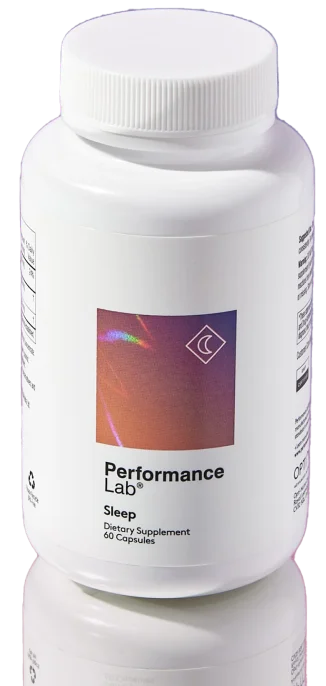If you want to find out more about the non essential amino acid tyrosine, you've come to the right place.
Perhaps you're wondering if it could double as a natural sleep aid for you. Or, conversely, you've heard that it's a nootropic and might help to boost your mental performance - but you first need to check that it won't also make you sleepy.
Either way, I have answers for you -- and the suggestion of a great natural sleep supplement if that's what you're looking for, or a great stack featuring tyrosine if you're looking for a quality nootropic instead.
Read on for more...
What is Tyrosine?

Tyrosine is an amino acid that plays a crucial role as a building block or precursor for the production of neurotransmitters in your brain, specifically dopamine and norepinephrine. We'll talk about those in a moment.
Tyrosine is one of several neurotransmitter precursors and amino acid precursors involved in brain function, supporting the synthesis of chemical messengers that influence mood, cognition, and stress response. It’s also useful for the creation of thyroid hormones.
Tyrosine is a nonessential amino acid. This doesn’t mean it’s not important, far from it! In this context, it simply means that your body can produce tyrosine by itself.
The body makes tyrosine through a biochemical process involving the conversion of another amino acid called phenylalanine. This process ensures the body produces enough tyrosine to support neurotransmitter synthesis.
Eating foods rich in either tyrosine and/or phenylalanine—or supplementing where necessary—will help support neurotransmitter production. Protein rich foods, such as meat, eggs, and fish, are important sources of tyrosine.
But back to dopamine and norepinephrine... what do these specific neurotransmitters do? Let’s briefly examine each in turn - because they give some great clues as to how useful tyrosine can be.
Dopamine

You may know dopamine as the 'feel good' chemical - it's part of your 'reward centre' and is heavily connected to mood, motivation and pleasure. You could argue that it's part of our evolutionary background - we earn a reward when we do things that help us survive, such as eat, drink, and reproduce.
When we do something pleasurable, the brain releases large amounts of dopamine which makes us feel great - so we want to do it again. It's why chocolate is so addictive. At least, so I've been told. Ahem. (1,2 )
Norepinephrine
Norepinephrine is made from dopamine, and is heavily connected to our 'fight or flight' mechanism, or how we react to stress. It puts us on alert, increases our attention, and triggers the release of adrenalin. (3)
Thyroid hormone
I mentioned that tyrosine is also used to make thyroid hormone, specifically thyroxine (one of two thyroid hormones). Put simply, the thyroid hormone controls the body’s metabolism - or how you transform the food you eat into energy.
Amino acid metabolism, including the conversion of tyrosine, is essential for proper thyroid hormone production and overall metabolic health.
Tryosine for Cognitive Function
Put all this together and we can see that tyrosine intake potentially plays an important role in our cognitive function and mental performance, specifically mental alertness, mood, motivation, energy, and reaction to stress.
For that reason, tyrosine is known as a nootropic - a natural ingredient that can potentially boost your cognitive performance. It is often sold in supplements designed for that aim. I can even recommend a great one for you - Mind Lab Pro.
But back to the question at hand: does it make you sleepy?
Can Tyrosine Make you Sleepy?

Let’s examine the question at the heart of this article: is tyrosine likely to make you sleepy?
We’ve already noted that tyrosine’s influence on thyroid levels helps to regulate metabolism and subsequent energy levels. The neurotransmitters dopamine and norepinephrine also help to keep you alert and motivated.
Given that tyrosine therefore promotes cognitive function and alertness, it’s very unlikely to cause sleepiness directly.
In fact, the opposite has been shown to be true.
Tyrosine administration, including l tyrosine pharmacotherapy, has been explored for its potential to enhance alertness and mental performance...
Tyrosine for Cognitive Function and Neurotransmitter Production
Tyrosine is a potential powerhouse when it comes to supporting cognitive function, thanks to its vital role in the production of key neurotransmitters like dopamine and norepinephrine.
As a nonessential amino acid, your body can make tyrosine, but getting enough through your diet or supplements can offer additional benefits, especially during times of stress or mental fatigue.
Research shows that dietary tyrosine benefits cognitive performance by helping to maintain optimal levels of neurotransmitters, which are crucial for mental performance, attention, and motivation.
When you’re under pressure - whether from environmental stress, sleep deprivation, or demanding tasks - tyrosine dietary supplementation may help suppress stress-induced rises in hormones like corticosterone and support working memory.
In fact, studies have found that tyrosine improves cognitive performance and helps you stay sharp when your brain is under strain.
Tyrosine’s importance is further highlighted in the context of inherited disorders such as phenylketonuria (PKU). In PKU, the body cannot convert the amino acid phenylalanine into tyrosine, leading to a deficiency that can impact cognitive development. In these cases, tyrosine supplementation is often used to help restore balance and support healthy brain function. (4)
Whether you’re looking to boost your mental performance during stressful periods or support overall cognitive health, tyrosine - either from food or supplements - can be a valuable addition to your routine. Its role as a neurotransmitter precursor makes it a key player in keeping your mind alert, focused, and resilient.
Let’s look at what studies into tyrosine have shown us…
Lack of Tyrosine Linked to Chronic Fatigue

One study examining Chronic Fatigue Syndrome (CFS) discovered that levels of tyrosine were significantly lower in patients with CFS. Suggesting a lack of tyrosine is what might make you sleepy, not the opposite way around.
Researchers theorised that reductions in tyrosine and tryptophan ingestion, with their knock on effect to serotonin and dopamine, may be involved in the ‘central perception of fatigue’. (5, 6)
Other studies have suggested that catecholamine depletion (depletion of dopamine, norepinephrine and epinephrine or adrenalin) worsens fatigue, again suggesting a lack of tyrosine may be linked to fatigue. (7)
In contrast, other studies in animals and humans have shown that tyrosine supplementation during active exercise may help delay physical fatigue and improve exercise tolerance. (8)
It may even reduce systolic blood pressure – tested on cadets after one week of a combat training course. (9)
Many of these findings are supported by double blind amino acids studies, which rigorously assess the effects of tyrosine supplementation on fatigue and cognitive function.
Changes in intracellular amino acids and indicator amino acid oxidation are also assessed in metabolic studies to better understand tyrosine's role in energy production and fatigue.
So it seems that rather than extra tyrosine making you sleepy, a lack of tyrosine may make you fatigued - and more of the amino acid may help to prevent it. More research is welcome on this.
May Reduce Mental Tiredness and Help Mental Performance
Studies have also shown that tyrosine helps to reduce mental tiredness, especially when stressed. The latter is the important point.
Both dopamine and norepinephrine (also known as catecholamines) are depleted during stressful conditions. By helping to encourage more of their production, tyrosine has been shown to prevent cognitive decline - and reduce mental tiredness - when under stress. (10)
Such stress also applies to sleep deprivation.
Helps During Sleep Deprivation

A 1995 trial that is still cited by many studies today kept participants awake for more than 24 hours and then put them through a battery of tests. Such tests required both cognitive thinking and physical dexterity (psychomotor tasks).
One half of the group were given tyrosine, the other half a placebo. Results showed that the tyrosine group experienced less decline of their psychomotor skills and were more able to sustain attention than the placebo group. This benefit lasted for three hours. (11)
Research has also shown that tyrosine improves working memory, particularly during periods of sleep deprivation and cognitive stress. More on that shortly.
To Summarise:
If you’re asking me if taking tyrosine can make you sleepy, I think we already have the answer to that - no. It shouldn’t. If anything, it potentially helps the brain to fight mental tiredness and act to increase stimulatory neurotransmitters such as dopamine and norepinephrine.
L-tyrosine benefits observed in clinical studies include improved cognitive function and reduced fatigue, especially when used as chronic dietary tyrosine supplements or through dietary l tyrosine supplementation.
Studies have shown that tyrosine improves cognitive performance under certain stressful circumstances, though it may not do as much for you if you aren’t stressed or if your neurotransmitter levels aren’t low.
It can potentially be a great benefit to keep you on your toes, however, if you have a particularly stressful job. Some people also take it ahead of intense exercise which can also deplete catecholamines.
Tyrosine may also have other benefits that aren’t related to sleep directly, such as…
Other Benefits of Tyrosine Supplementation
Reduces Memory Problems when Under Stress
Tyrosine has been shown to help alleviate memory problems under acutely stressful conditions - again, likely due to its ability to increase depleted catecholamines. (12)
One small study examined working memory, important for following instructions and concentrating. The results showed that tyrosine significantly helped to improve working memory during a mentally challenging task, when compared to a placebo. (13)
Taking this further, an in-depth examination of 15 studies concluded that tyrosine loading ahead of a stressful event could help to counteract reductions in information processing and working memory caused by demanding situations, whether it be on cognitive load or extreme weather. (14)
May Boost Mood

Given that tyrosine helps to increase dopamine, closely connected to mood, it stands to reason that tyrosine supplementation may help to boost mood.
One study in Antarctica, for instance, claimed that people who supplemented with tyrosine regularly during their arctic winter enjoyed a 47% increase in mood scores, while the control group saw a 136% decrease in theirs. This wasn't replicated into the summer - which would make sense given that tyrosine works best during stressful times. (15)
Another earlier study examined the use of tyrosine supplementation on Dopamine Dependent Depression, and noted that participants experienced better sleep and improved mood afterwards. (16)
Other evidence is mixed, however, and more research is needed for clarification before it can be officially recommended as a treatment for low mood or depression.
May Strengthen Cognitive Flexibility
Cognitive flexibility describes the ability to switch between thoughts or tasks - the faster we can do this, the greater our cognitive flexibility.
22 participants took part in this trial, given either a tyrosine supplement or placebo. While the study was very small, it concluded that tyrosine did help improve cognitive flexibility. Researchers suggest this may be because cognitive flexibility is potentially modulated by dopamine. (17)
Sources of Tyrosine and Dosage

You can find tyrosine in dietary sources such as fish, eggs, dairy products, beans, nuts, wheat and oats.
It is also widely available in supplements, often pre-workouts and nootropic stacks such as our favourite, Mind Lab Pro.
Recommended dosage: 100-150mg/ kg of tyrosine daily tends to be the maximum dose used in supplements. If you want to take it for a particular condition, you should speak to your doctor first. (18)
Tyrosine Interactions and Side Effects
Tyrosine appears to be well tolerated at moderate doses and appears to be safe at dosages of up to 150mg per kg a day for up to three months.
Some people may experience side effects such as headache, nausea, heartburn and fatigue - and yes, I know the latter is a little odd considering tyrosine's stimulating effects. (19)
While tyrosine supplements can offer a range of benefits, it’s also important to be aware of how they might interact with other medications and nutrients. Tyrosine supplementation can affect the way your body processes certain drugs, especially those related to thyroid hormone and neurotransmitter production.
For example, if you’re taking thyroid hormone pills, adding tyrosine supplements could increase your thyroid hormone levels, potentially leading to symptoms of too much thyroid hormone, such as anxiety, rapid heartbeat, or even more serious complications, especially if you have an overactive thyroid or Graves’ disease.
Similarly, taking tyrosine with levodopa, a medication used for Parkinson’s disease, can reduce the drug’s absorption and effectiveness, making it less helpful for managing symptoms.
Tyrosine can also interact with monoamine oxidase inhibitors (MAOIs), a class of medications used to treat depression. Combining these with tyrosine may increase the risk of high blood pressure or other side effects, so it’s crucial to consult your healthcare provider before starting tyrosine supplementation if you’re on these medications. (20)
Beyond medications, tyrosine can influence the balance of other amino acids in your body. For instance, it may compete with other amino acids, such as tryptophan or branched chain amino acids, for absorption and transport.
This can affect neurotransmitter production and muscle recovery, especially if you’re also supplementing with protein and amino acids for athletic performance. (21)
To ensure safe and effective use, always talk to your healthcare provider before taking tyrosine supplements, especially if you’re managing a medical condition or taking other medications. Being mindful of these potential interactions will help you get the most benefit from tyrosine while minimizing any risks.
Taking L Tyrosine Supplements
If you're keen to try tyrosine supplementation, you can find it in standalone supplements or as contributory ingredients in different supplements, such as a nootropic stack or pre-workout. Look for the words tyrosine, L-tyrosine, or N Acetyl L tyrosine, a premium form of the amino acid.
Best Nootropic Stack Featuring Tyrosine
 Mind Lab Pro describes itself as the world's 'most advanced nootropic formula' with eleven research-backed nutrients. N-Acetyl L-Tyrosine is one such ingredient, with 175mg included here, alongside l-theanine and Rhodiola Rosea for calming anti-stress relief.
Mind Lab Pro describes itself as the world's 'most advanced nootropic formula' with eleven research-backed nutrients. N-Acetyl L-Tyrosine is one such ingredient, with 175mg included here, alongside l-theanine and Rhodiola Rosea for calming anti-stress relief.
Other ingredients include Bacopa Monnier, Citicoline, B vitamins B6, 9 and 12, lion's mane mushroom, Maritime Pine Bark extract and Phosphatidylserine.
All designed to work on different pathways - from brain health to brain chemistry, energy, regeneration, circulation, and more. It's a very popular nootropic stack that tackles cognitive function and performance in several different ways.
Best Natural Sleep Aid - that Isn't Tyrosine!
 If you came to this article hoping for a natural sleep aid in tyrosine, I'm sorry to disappoint you. However, I don't want you to leave empty handed so here's my suggestion for a sleep supplement that really does work.
If you came to this article hoping for a natural sleep aid in tyrosine, I'm sorry to disappoint you. However, I don't want you to leave empty handed so here's my suggestion for a sleep supplement that really does work.
Performance Lab Sleep combines just four ingredients to give you an effective natural sleep aid. It includes Montmorency tart cherries - a natural low-dose melatonin source - along with tryptophan that helps to encourage your own melatonin production.
It is rounded out by magnesium, to relax muscles ahead of sleep, and anti-anxiety lemon balm to calm and soothe. All ingredients are research backed.


Final Thoughts
If you're struggling with a stressful job or stressful events, you may want to take tyrosine or increase your tyrosine levels to help you deal with stress and stay focused - look to increase your tyrosine-rich foods, or take tyrosine supplements. Or opt for a quality nootropic stack such as Mind Lab Pro.
Tyrosine shouldn't make you sleepy if you stick to safe dosage, so you don't need to worry about that.
Alternatively, if you were seeking a natural way to encourage sleep, forget tyrosine and opt for a tailor-made stack such as Performance Lab Sleep instead.















